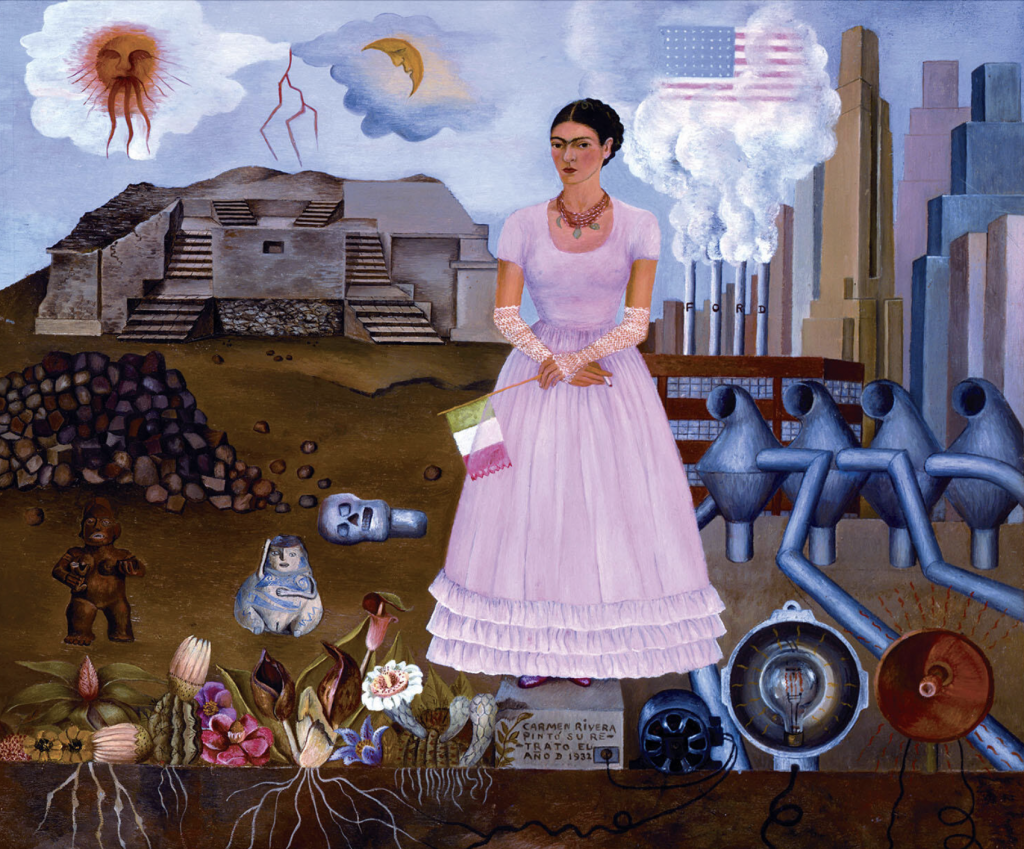
Frida Kahlo(1907-54), Self Portrait on the Borderline between Mexico and the United States,1932.
Writing this blog and engaging in discussions about racism has been challenging. Racism is vast, nuanced, and deeply rooted, making it difficult to explore meaningfully in 500 words. As an immigrant and part of the global majority, I’ve lived in the UK for over a decade and have sometimes struggled to feel valued and integrated—especially during my time in higher education.
As a student at UAL, I had a particularly disheartening experience. My voice wasn’t heard, leading to a low mark that shattered my confidence as a creative for years. The way we treat students today has lasting consequences. It limits diverse imagined futures and pressures them to “adapt” to predominantly white academic norms. The psychological toll is immense (Garrett, 2024). I now see students facing similar issues: work being censored or dismissed for not being “good enough,” ideas misunderstood, and assessments affected by language barriers or differing learning styles.
Being a technician is a double-edged sword. On one hand, I can take a person-centred approach, meeting students individually, having open conversations, offering flexible, interest-based sessions outside the curriculum. International students interestingly engage most in these sessions, eager to understand UK theatre while sharing their own cultures. This exchange helps me tailor support and build mutual understanding. On the other hand, I often feel powerless to advocate meaningfully for them, as technicians’ insights are frequently overlooked.
My frustrations were echoed in a TEDx talk by Sadiq (2023), who critiqued tokenistic Diversity, Equity and Inclusion (DEI) approaches in institutions like UAL. While many individuals within the college are committed to real change, the overarching DEI strategy often feels corporate and performative. Sadiq’s reflection that “we remember experiences even if they are uncomfortable” deeply resonated with me. I believe there’s a growing fear especially around race of being attacked or misinterpreted, which stifles honest dialogue.
Chimamanda Ngozi Adichie also explores this in her discussion on free speech. She warns that in trying to protect marginalized groups, society sometimes enforces a new orthodoxy that ironically undermines diversity by limiting open dialogue. For Adichie, real diversity includes freedom of thought the ability to ask questions, make mistakes, and share uncomfortable truths (Adichie, 2022).
To confront racism, we must foster open conversations. Shutting people down creates resentment, not understanding. As educators, we should embrace discomfort and be better trained and supported to navigate conflict. Storytelling, for instance, is a powerful way to spark curiosity and empathy (Lee Anne Bell, 2019). It helps us challenge each other and ourselves respectfully. Recognising that we all have the capacity for bias is vital. The real work lies in catching and confronting our own prejudices, not becoming defensive.
I have much more to say, but limited space. Still, I hope this reflection sheds light on the importance of open dialogue, authentic inclusion, and the need to support both students and staff in meaningful, practical ways.
References
Adichie, C.N. (2022) On freedom of speech. [Video] Available at: https://www.youtube.com (Accessed: 10 June 2025).
Garrett, R. (2024) The psychological toll of racism in education. London: Inclusive Press.
Lee Anne Bell (2019). Storytelling for Social Justice. Routledge.
Sadiq, T. (2023) The illusion of inclusion. TEDxTalks. Available at: https://www.ted.com (Accessed: 10 June 2025).
One response to “Blog 3 – Race”
-
Thank you so much for this, Paula. I firstly want to acknowledge your own negative experiences as a global majority student at UAL. We are so lucky that we retained your commitment, talent and expertise in spite of this.
The question of freedom of speech is a very live one, with the OfS having published new guidance just this week about Freedom of Speech*. I have personal concerns about how it might lead to negative views about protected groups being permitted – and agree with you that dialogue is so essential for learning.
What do these questions, particularly in relation to race and racism, mean for your practice at Wimbledon? You begin to cover this when you say how you work 1:1 with students. I suppose I’m curious about what racial inequities you notice for the students you support and these might be responded to?
Side note: I’m imagining you’ve also seen Adiche’s TED talk ‘The Danger of a Single Story’, which relates to storytelling too? If not, you might like it.
*https://www.officeforstudents.org.uk/news-blog-and-events/press-and-media/ofs-publishes-free-speech-guidance-as-polling-shows-one-in-five-academics-do-not-feel-free-to-teach-controversial-views/
Leave a Reply